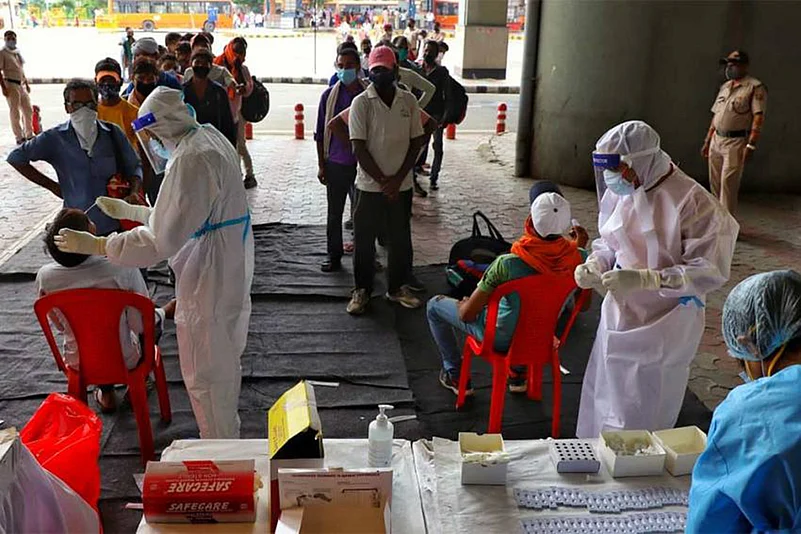The coronavirus pandemic which has brought the world to its knees by causing a major burnout among the healthcare workers and making the world economies weaker than ever before, is unfortunately still far from over.
Despite having one of the strictest lockdowns, India accounts for the second highest number of total cases in the world after the United States. Although we have witnessed a steep decline in the overall positivity rate, with festivities around the corner and easing restrictions, we need to tread cautiously if we are to put an end to this adversity. We have seen the proven results of persistent aggressive testing, tracing and isolating across India and it is safe to say that it is one of the most efficient and plausibly the only way through which the virus can be arrested and contained.
Managing a pandemic of this nature and scale has been quite an uphill task for governments across the world, including India, where the focus has not only been on mitigating the spread of the virus but to also minimise the socio-economic damage caused as an aftermath. With limited health infrastructure and surging cases having a debilitating impact on healthcare workers, there is a need to take a collaborative approach in Covid-19 management, including greater involvement of the civil society organisations to support the efforts of the government to manage the pandemic. South Korea has garnered applause for managing the pandemic swiftly. The country’s civil society organisations played a pivotal role by monitoring the situation closely, assisting the government, and reaching the most vulnerable social groups.
Role of community mobilisation in managing the Covid-19 pandemic
In the past, community mobilization with the support of CSOs have assisted the governments in management and eradication of diseases like polio, measles-rubella and smallpox, and helped fill in the gaps where the governments were unable to reach.
The most recent example we can cite is of Southeast Asian countries where the civil society organisations (CSOs) are coming up with innovative solutions to fight Covid-19 and reaching out to the most vulnerable sections. The CSOs in Thailand are debunking fake news and fighting two battles, i.e. the ‘infodemic’ (as called by the WHO officials) and the pandemic.
Through the ‘Sabaidee Project’, smartphone users in the country can store their state of health and possible symptoms on their devices and the app then forwards the data anonymously to the Thai disease control authority. When sufficient data gets collected, an algorithm evaluates where a new coronavirus hotspot might form and traces people accordingly.
In Bangladesh, around 200 NGOs provided pecuniary support to local NGOs and people for medical, and food support. They distributed hygiene kits to the underprivileged and spread awareness about the pandemic. In the 1970s, India was hailed to eradicate smallpox through the aid of its civil society organisations, where thousands of healthcare workers and one lakh community workers trained by WHO went door to door in the country and covered a hundred million households in 575,721 villages and 2,641 cities. Their labour bore fruit when the deadly disease was eliminated from India in 1977. Likewise, the untiring efforts of NGOs and CHOs to allay the coronavirus would again be recorded in history when the pandemic is over.
During this grim time, our country has also seen its civil society organisations (CSOs) rising to the occasion and working relentlessly with the government especially for relief work during and after the lockdowns to ensure communities are getting access to essential services. However, there is a potential for CSOs to assume a much bigger role in Covid-19 management by means of patient care, community sensitization on behavioural change, hygiene promotion, and contact-tracing. For example, Dharavi, which is Asia’s biggest and densest slum, saw members of the civil society getting involved with healthcare workers for contact-tracing the population of the slum and helped in the fast tracking of cases. From 491 positive cases in April to 1,216 cases with over 56 deaths in May and then reducing the numbers significantly with zero deaths in June was not an easy feat to achieve but the united efforts of CSOs and the government taskforce exhibited that it was possible.
Need for collaborative approach
As we are entering a crucial phase of pandemic response, engagement with CSOs will hold the key for reducing the caseload. Ensuring hand washing, respiratory etiquettes, identification of contracts and contact tracing, identification of positives and isolation is the key and basis of epidemic management, knowledge dissemination through these NGOs helps in raising confidence and reducing stigma. Despite technological advancement for contract tracing, the use is limited, and the effectiveness of such technological interface will require an active engagement and compliance at community level, which these organisations can fulfil.
Making better use of the workforce that is potentially available and promoting workforce growth in quantity and quality would help solve the existing crisis to a great extent. Earlier this year in May, the Empowered Group 6 constituted by the government motivated a network of 92,000 CSOs/NGOs to mobilise their resources to assist the state governments and district administrations in identifying hotspots and deputing volunteers to deliver essential services to the vulnerable and in creating awareness about the coronavirus which was very well envisaged approach from the government’s end.
While the future of our supposed normal life might seem uncertain, the one thing that can be said with true conviction is that the collective efforts of our society have been a glimmer of hope and if we are to triumph, we will have to continue at it and accelerate our efforts to defeat the virus.
(The author is senior consultant, health, NITI Aayog)
















